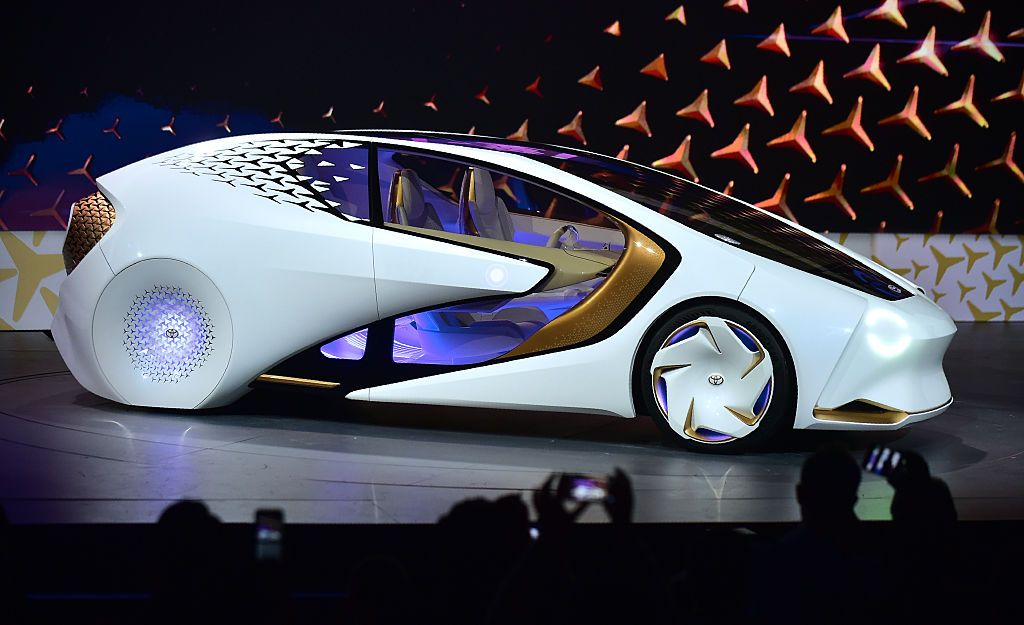Fastback styling was something of a fad in 1940s America. It had to do with providing cars with a streamlined, aerodynamically-inspired appearance along with some actual aerodynamic efficiency.
In those days, it was assumed by stylists that good aerodynamic efficiency could be created using the shape of a notional teardrop: rounded at the front, tapering to a point at the rear. It turned out that a really efficient teardrop shape resulted in an impractically long body, so some compromises had to be made while preserving a general teardrop appearance on the aft half of a car.
The actual practical solution to automobile aerodynamics is the Kammback, where the teardrop taper is chopped vertically at some point, allowing for cars of useful exterior sizes and interior space utilization at little reduction in aerodynamic efficiency. Research in the area was conducted in Germany in the 1930s, but was not implemented on production cars for many years.
General Motors' stylists did a very nice job of designing fastback bodies during the 1940s. But there was a problem: those cars didn't sell as well as expected. That was because GM's fastbacks had noticeably less trunk space than equivalent bustle-back sedans. GM phased out fastbacks in the early 1950s.
The fastbacks with the smallest trunk capacity were found on Oldsmobiles, Buicks and Cadillacs. The reason was that the trailing shape of the passenger compartment narrowed in a kind of echo of sporty "boat tailed" cars. I wrote about those echoes here.
For examples of post- World War 2 GM 2-door sedan fastbacks, I limited the images to the Buick line.
1948 Buick Roadmaster Sedanette - Barrett-Jackson photo
This body first appeared on some 1942 Buicks and was carried over for model years 1946-48.
1948 Buick Roadmaster Sedanette - for sale photo
This rear view shows the amount of taper -- less extreme than on later fastbacks.
1949 Buick Super Sedanette - Mecum Auctions photo
Buick Supers and Roadmasters got new bodies for 1949. The boat-tail taper is more extreme than on the older bodies. The roof curve is more refined, creating a lighter, more graceful appearance, The aft side windows end in a dog-leg, this also creating a less ponderous look. All this except for the window shape yielded less trunk space.
1950 Buick Special Sedanet - for sale photo
This was the last year for Buick fastbacks even though 1950 bodies were redesigns. The roof curve runs a bit higher than on the '49s and is more rounded in longitudinal profile. Aft side window shapes revert to the 1948 pattern. The trunk opening is smaller than the '49 version.
Fastback styling was something of a fad in 1940s America. It had to do with providing cars with a streamlined, aerodynamically-inspired appearance along with some actual aerodynamic efficiency.
In those days, it was assumed by stylists that good aerodynamic efficiency could be created using the shape of a notional teardrop: rounded at the front, tapering to a point at the rear. It turned out that a really efficient teardrop shape resulted in an impractically long body, so some compromises had to be made while preserving a general teardrop appearance on the aft half of a car.
The actual practical solution to automobile aerodynamics is the Kammback, where the teardrop taper is chopped vertically at some point, allowing for cars of useful exterior sizes and interior space utilization at little reduction in aerodynamic efficiency. Research in the area was conducted in Germany in the 1930s, but was not implemented on production cars for many years.
General Motors' stylists did a very nice job of designing fastback bodies during the 1940s. But there was a problem: those cars didn't sell as well as expected. That was because GM's fastbacks had noticeably less trunk space than equivalent bustle-back sedans. GM phased out fastbacks in the early 1950s.
The fastbacks with the smallest trunk capacity were found on Oldsmobiles, Buicks and Cadillacs. The reason was that the trailing shape of the passenger compartment narrowed in a kind of echo of sporty "boat tailed" cars. I wrote about those echoes here.
For examples of post- World War 2 GM 2-door sedan fastbacks, I limited the images to the Buick line.
1948 Buick Roadmaster Sedanette - Barrett-Jackson photo
This body first appeared on some 1942 Buicks and was carried over for model years 1946-48.
1948 Buick Roadmaster Sedanette - for sale photo
This rear view shows the amount of taper -- less extreme than on later fastbacks.
1949 Buick Super Sedanette - Mecum Auctions photo
Buick Supers and Roadmasters got new bodies for 1949. The boat-tail taper is more extreme than on the older bodies. The roof curve is more refined, creating a lighter, more graceful appearance, The aft side windows end in a dog-leg, this also creating a less ponderous look. All this except for the window shape yielded less trunk space.
1950 Buick Special Sedanet - for sale photo
This was the last year for Buick fastbacks even though 1950 bodies were redesigns. The roof curve runs a bit higher than on the '49s and is more rounded in longitudinal profile. Aft side window shapes revert to the 1948 pattern. The trunk opening is smaller than the '49 version.
















EmoticonEmoticon